最新整理雅思写作高分范文赏析:Cloning
cloning的英文作文
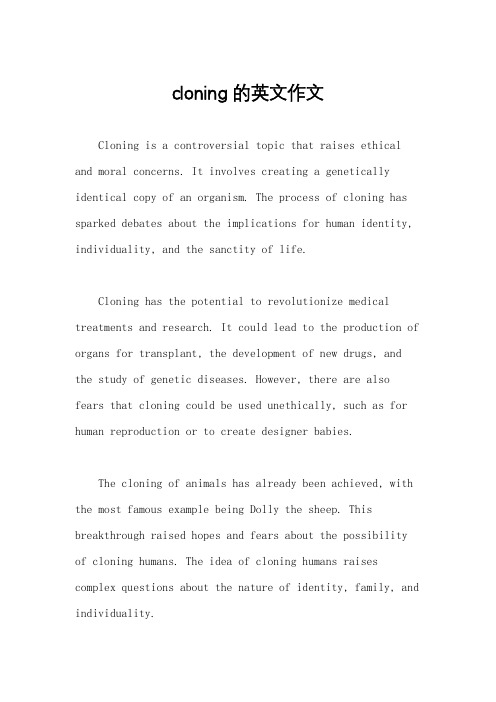
cloning的英文作文Cloning is a controversial topic that raises ethical and moral concerns. It involves creating a genetically identical copy of an organism. The process of cloning has sparked debates about the implications for human identity, individuality, and the sanctity of life.Cloning has the potential to revolutionize medical treatments and research. It could lead to the production of organs for transplant, the development of new drugs, and the study of genetic diseases. However, there are also fears that cloning could be used unethically, such as for human reproduction or to create designer babies.The cloning of animals has already been achieved, with the most famous example being Dolly the sheep. This breakthrough raised hopes and fears about the possibility of cloning humans. The idea of cloning humans raises complex questions about the nature of identity, family, and individuality.From a scientific perspective, cloning presents a range of challenges and limitations. It is a complex andinefficient process, with a high rate of failure and health issues in cloned animals. The long-term effects of cloning on the health and lifespan of organisms are still not fully understood.The ethical and moral implications of cloning aredeeply divisive. Some argue that it is a violation of the natural order and raises concerns about the potential for exploitation and abuse. Others believe that it has the potential to alleviate suffering and improve human life.In conclusion, cloning is a complex and contentious issue that raises profound questions about science, ethics, and humanity. The potential benefits and risks of cloning must be carefully considered and weighed against each other. As technology continues to advance, the ethical and moral implications of cloning will remain a topic of intense debate.。
克隆利弊 英语作文

克隆利弊英语作文Cloning: Pros and Cons。
Cloning is a highly controversial topic that has been debated for decades. Cloning refers to the process of creating an identical copy of an organism or cell. While cloning has the potential to revolutionize medicine and science, it also raises ethical and moral concerns. In this essay, we will explore the pros and cons of cloning.Pros:1. Medical Advancements: Cloning has the potential to revolutionize medicine. Scientists can use cloning to create stem cells that can be used to treat diseases such as Parkinson's, Alzheimer's, and diabetes. Cloning can also be used to create organs for transplant, reducing the need for donors.2. Reproduction: Cloning can enable infertile couplesto have children. Additionally, cloning allows parents to create a child with desired traits, such as intelligence, athleticism, and physical appearance.3. Animal Conservation: Cloning can be used to preserve endangered species. By cloning animals that are at risk of extinction, scientists can create a genetically diverse population that can be reintroduced into the wild.Cons:1. Ethical Concerns: Cloning raises serious ethical concerns. Many people believe that cloning is playing God and that it is morally wrong to create life in a laboratory. Additionally, cloning can lead to a lack of genetic diversity, which can have negative consequences for the survival of a species.2. Safety Concerns: There are safety concernsassociated with cloning. Cloned animals often have health problems and do not live as long as non-cloned animals. Additionally, there is a risk that cloned organisms couldhave unintended genetic mutations that could lead to unforeseen consequences.3. Social Implications: Cloning could have negative social implications. For example, cloning could lead to a society where people are valued based on their genetic makeup, rather than their individual qualities and accomplishments. Additionally, cloning could lead to a widening gap between the rich and poor, as only the wealthy could afford to clone their children.In conclusion, cloning is a complex issue with both pros and cons. While cloning has the potential to revolutionize medicine and science, it also raises ethical and moral concerns. It is important that we carefully consider the implications of cloning before we proceed with this technology.。
关于克隆英文作文
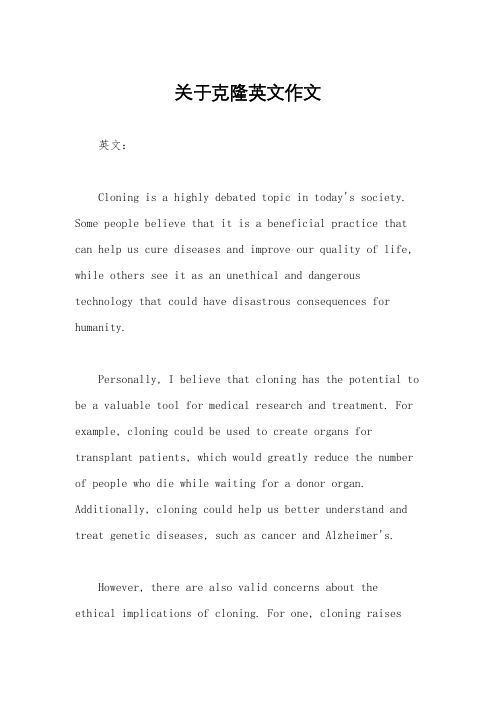
关于克隆英文作文英文:Cloning is a highly debated topic in today's society. Some people believe that it is a beneficial practice that can help us cure diseases and improve our quality of life, while others see it as an unethical and dangerous technology that could have disastrous consequences for humanity.Personally, I believe that cloning has the potential to be a valuable tool for medical research and treatment. For example, cloning could be used to create organs for transplant patients, which would greatly reduce the number of people who die while waiting for a donor organ. Additionally, cloning could help us better understand and treat genetic diseases, such as cancer and Alzheimer's.However, there are also valid concerns about theethical implications of cloning. For one, cloning raisesquestions about the value of human life and the potential for abuse by those in power. Additionally, there are worries about the safety of cloning technology and the potential for unintended consequences, such as the creation of clones with genetic defects or abnormalities.Despite these concerns, I believe that cloning should be allowed for medical purposes as long as it is heavily regulated and monitored. With proper oversight, cloning could be a valuable tool for advancing medical research and improving our quality of life.中文:克隆是当今社会上备受争议的话题。
对克隆的看法英语作文

Cloning is a scientific process that has sparked a multitude of debates and discussions around the world.The topic of cloning is complex and multifaceted,touching on ethical,moral,and scientific considerations.Here are some key points to consider when discussing ones views on cloning:1.Ethical Concerns:Cloning raises significant ethical questions.For instance,is it morally right to create a life that is genetically identical to another?Some argue that cloning could lead to a loss of individuality and the uniqueness of human beings.2.Scientific Advancements:On the scientific front,cloning has the potential to advance our understanding of genetics and could be used for beneficial purposes such as cloning organs for transplantation,which could save many lives.3.Medical Implications:Cloning could revolutionize medicine by providing a means to test new drugs and treatments on genetically identical organisms,potentially leading to more effective and safer treatments for various diseases.4.Reproductive Cloning vs.Therapeutic Cloning:Its important to differentiate between reproductive cloning,which aims to produce a genetically identical human being,and therapeutic cloning,which is used for medical research and treatment.The former is widely considered more controversial due to the potential for misuse and the ethical implications of creating a human being for the purpose of reproduction.5.Animal Cloning:The success of cloning in animals,such as Dolly the sheep,has paved the way for further research.However,the high failure rates and health issues in cloned animals raise concerns about the safety and feasibility of cloning for humans.6.Legal and Regulatory Issues:Many countries have strict laws against human cloning due to the aforementioned ethical concerns.The debate over whether to legalize or ban cloning is ongoing,with proponents arguing for the potential benefits and opponents citing the risks and ethical issues.7.Public Perception:The publics perception of cloning is largely influenced by media portrayals and sensationalized stories.This can lead to misunderstandings and fear,which may not always be based on scientific facts.8.Religious and Philosophical Views:Different religions and philosophical systems have their own perspectives on cloning.Some see it as an affront to the natural order or divine creation,while others may be more accepting of the technology if it is used for the betterment of humanity.9.Potential for Misuse:There are concerns that cloning technology could be misused for nefarious purposes,such as creating armies of clones or for the cloning of individuals for personal gain.10.Future Implications:The longterm implications of cloning are unknown.Its essential to consider how cloning might affect society,relationships,and the concept of family in the future.In conclusion,ones view on cloning is likely to be influenced by a combination of these factors.Its a topic that requires careful consideration and balanced discussion,taking into account both the potential benefits and the significant ethical and societal implications.。
克隆的好坏英文作文

克隆的好坏英文作文英文:Cloning has been a topic of debate for many years. While some people believe that cloning can bring about many benefits, others argue that it can have negative consequences. In my opinion, cloning can be both good and bad, depending on how it is used.On the one hand, cloning can be a useful tool in medical research. For example, scientists can clone animals to study diseases and test new treatments. This can lead to the development of new medicines that can save lives. Additionally, cloning can be used to create organs for transplantation, which can help to save the lives of those in need.On the other hand, cloning can have negative consequences. For example, cloning can lead to a lack of genetic diversity, which can make a population morevulnerable to disease and other environmental factors. Additionally, cloning can be used for unethical purposes, such as creating clones for the purpose of slavery or exploitation.Overall, I believe that cloning can be both good and bad, depending on how it is used. While it can bring about many benefits, it is important to use it ethically and responsibly.中文:克隆技术一直是一个争议的话题。
英文作文关于克隆
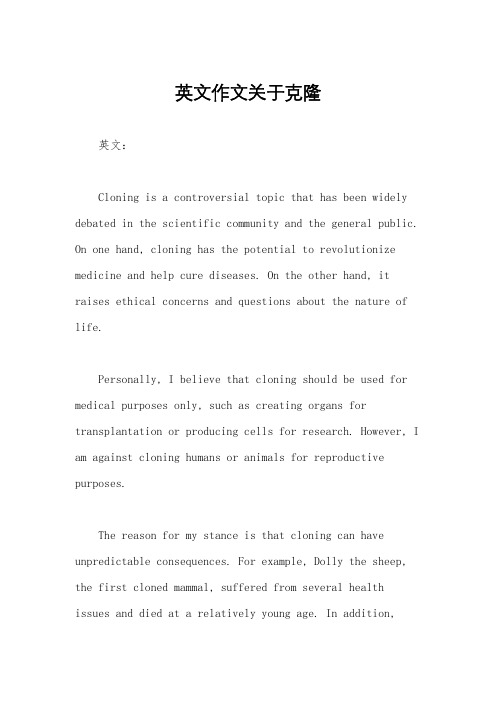
英文作文关于克隆英文:Cloning is a controversial topic that has been widely debated in the scientific community and the general public. On one hand, cloning has the potential to revolutionize medicine and help cure diseases. On the other hand, it raises ethical concerns and questions about the nature of life.Personally, I believe that cloning should be used for medical purposes only, such as creating organs for transplantation or producing cells for research. However, I am against cloning humans or animals for reproductive purposes.The reason for my stance is that cloning can have unpredictable consequences. For example, Dolly the sheep, the first cloned mammal, suffered from several health issues and died at a relatively young age. In addition,cloning raises questions about individuality and the uniqueness of life. If we can create exact copies of ourselves or other living beings, what does that say about our identity and our place in the world?Furthermore, cloning can also have negative impacts on society. For instance, it could lead to a decrease in genetic diversity and increase the risk of genetic diseases. It could also perpetuate inequalities and discrimination,as only those who can afford cloning technology would have access to it.中文:克隆是一个备受争议的话题,引起了科学界和公众的广泛讨论。
clone有关英文作文
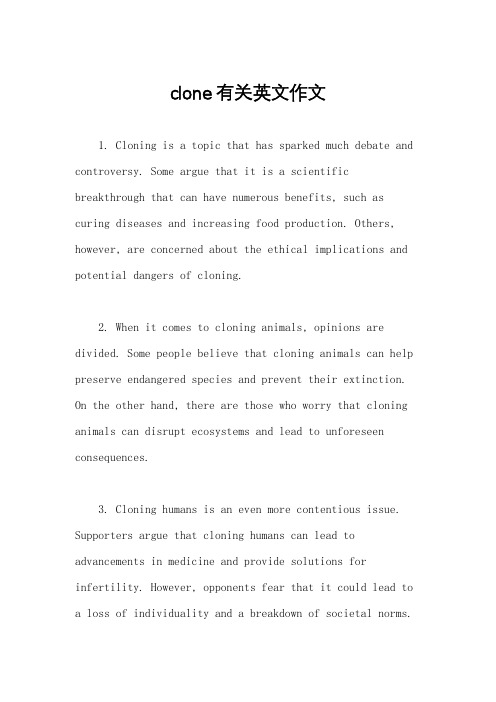
clone有关英文作文1. Cloning is a topic that has sparked much debate and controversy. Some argue that it is a scientific breakthrough that can have numerous benefits, such as curing diseases and increasing food production. Others, however, are concerned about the ethical implications and potential dangers of cloning.2. When it comes to cloning animals, opinions are divided. Some people believe that cloning animals can help preserve endangered species and prevent their extinction. On the other hand, there are those who worry that cloning animals can disrupt ecosystems and lead to unforeseen consequences.3. Cloning humans is an even more contentious issue. Supporters argue that cloning humans can lead to advancements in medicine and provide solutions for infertility. However, opponents fear that it could lead to a loss of individuality and a breakdown of societal norms.4. The process of cloning involves creating a genetically identical copy of an organism. This can be done through various techniques, such as somatic cell nuclear transfer or artificial embryo twinning. While these methods have shown some success, there are still many challenges and limitations to overcome.5. One of the main concerns with cloning is the potential for genetic abnormalities and health issues in cloned organisms. Studies have shown that cloned animals often have shorter lifespans and higher rates of health problems compared to naturally conceived animals. This raises questions about the long-term effects of cloning on the overall health and well-being of organisms.6. Another issue with cloning is the ethical dilemma it poses. Cloning raises questions about the value of individuality and the potential for exploitation. Additionally, the idea of creating life in a laboratory raises concerns about playing God and the potential for misuse of this technology.7. Despite the controversies surrounding cloning, research in this field continues to advance. Scientists are constantly working on improving cloning techniques and addressing the challenges associated with it. It is important for society to have ongoing discussions and debates about the ethical and practical implications of cloning, as it is a topic that will continue to shape our future.。
关于克隆的英语作文
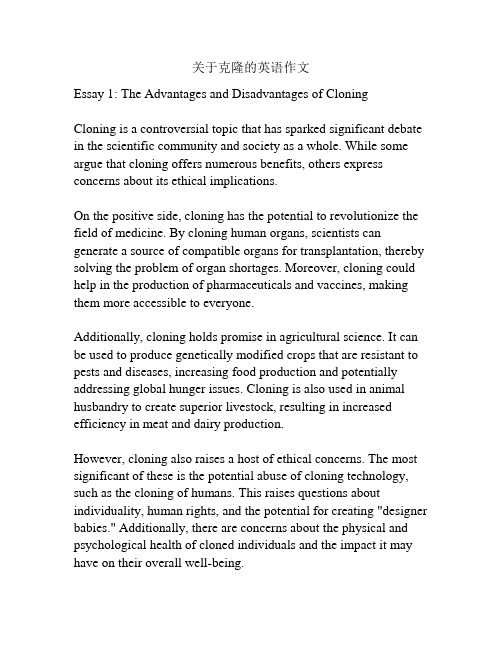
关于克隆的英语作文Essay 1: The Advantages and Disadvantages of CloningCloning is a controversial topic that has sparked significant debate in the scientific community and society as a whole. While some argue that cloning offers numerous benefits, others express concerns about its ethical implications.On the positive side, cloning has the potential to revolutionize the field of medicine. By cloning human organs, scientists can generate a source of compatible organs for transplantation, thereby solving the problem of organ shortages. Moreover, cloning could help in the production of pharmaceuticals and vaccines, making them more accessible to everyone.Additionally, cloning holds promise in agricultural science. It can be used to produce genetically modified crops that are resistant to pests and diseases, increasing food production and potentially addressing global hunger issues. Cloning is also used in animal husbandry to create superior livestock, resulting in increased efficiency in meat and dairy production.However, cloning also raises a host of ethical concerns. The most significant of these is the potential abuse of cloning technology, such as the cloning of humans. This raises questions about individuality, human rights, and the potential for creating "designer babies." Additionally, there are concerns about the physical and psychological health of cloned individuals and the impact it may have on their overall well-being.In conclusion, cloning brings both advantages and disadvantages to society. While it offers potential medical and agricultural benefits, we must also carefully consider the ethical implications and potential risks associated with cloning.Essay 2: The Ethical Dilemma of Cloning in Relation to Animal WelfareCloning is a topic that not only sparks ethical debates but also raises concerns about animal welfare. Cloning animals, although technically an impressive scientific achievement, forces us to question the moral implications of manipulating living beings for our own purposes.On one hand, supporters of animal cloning argue that it can be used to preserve endangered species and revive extinct ones. By cloning endangered animals, we can potentially restore their populations and prevent their extinction. Moreover, animal cloning can also be used for medical research purposes, leading to breakthroughs in the understanding and treatment of diseases. However, the ethical concerns surrounding animal cloning cannot be overlooked. Cloning involves extensive laboratory manipulation and often results in high failure rates and suffering for the animals involved. Cloned animals may exhibit various health problems and reduced lifespan, as seen in the case of Dolly the sheep, the world's first cloned animal. Additionally, cloning undermines the principles of natural selection and genetic diversity, which are essential for the survival and evolution of species.Furthermore, the economic aspect of animal cloning also raises questions about the prioritization of resources. Should we invest significant funds and resources into cloning animals when there are pressing issues such as animal rights, habitat conservation, and combating climate change that require our attention?In conclusion, the ethical dilemma of animal cloning demands careful consideration of the potential benefits and the ethical concerns it raises in terms of animal welfare and resource allocation.Essay 3: The Future of Cloning and its Impact on SocietyCloning has long been a topic of fascination and speculation in science fiction. However, recent advancements in cloning technology have brought us closer to a reality where human cloning could become a possibility. The implications of this potential breakthrough for society are vast and multifaceted.With the ability to clone humans, society would face a multitude of ethical and moral challenges. The idea of creating life in a laboratory raises questions about the sanctity of human life, individuality, and the very nature of what it means to be human. Additionally, concerns arise regarding the potential for cloning to be exploited for nefarious purposes, such as human trafficking or the creation of a controlled society.Furthermore, cloning could have profound social, economic, and psychological impacts. The socio-economic divide could widen as only the wealthy would have access to cloning technology,resulting in further inequality. The psychological well-being of cloned individuals may be negatively affected as they struggle with questions of identity and purpose. Additionally, the impact on family structures and relationships could be significant, as the distinction between biological and cloned children becomes blurred.However, despite the potential risks and concerns, cloning also holds promise for medical advancements and scientific breakthroughs. Cloned cells and tissues could revolutionize regenerative medicine, offering potential treatments for diseases and conditions that were previously untreatable. Additionally, cloning could provide a valuable resource for research, enabling scientists to study the intricate facets of human biology more comprehensively.In conclusion, the future of cloning and its impact on society is a complex and controversial topic. As we navigate the possibilities and challenges of this technology, it is crucial to ensure comprehensive discussions that weigh the potential benefits against the ethical and societal concerns that arise.。
cloning有关英文作文
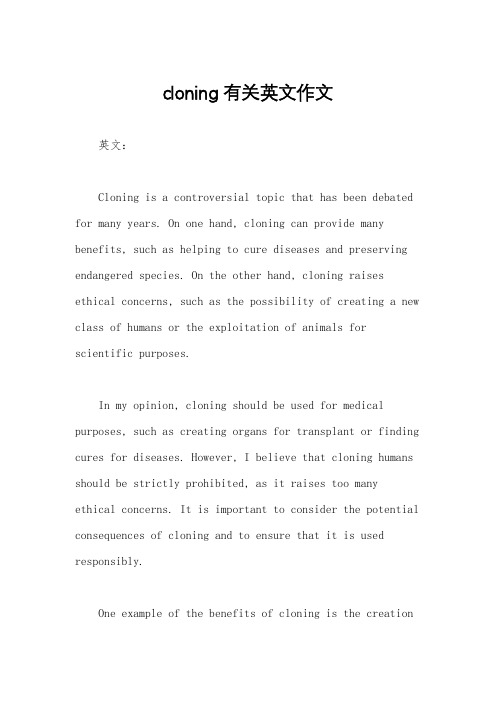
cloning有关英文作文英文:Cloning is a controversial topic that has been debated for many years. On one hand, cloning can provide many benefits, such as helping to cure diseases and preserving endangered species. On the other hand, cloning raises ethical concerns, such as the possibility of creating a new class of humans or the exploitation of animals forscientific purposes.In my opinion, cloning should be used for medical purposes, such as creating organs for transplant or finding cures for diseases. However, I believe that cloning humans should be strictly prohibited, as it raises too manyethical concerns. It is important to consider the potential consequences of cloning and to ensure that it is used responsibly.One example of the benefits of cloning is the creationof Dolly the sheep, the first mammal to be cloned from an adult cell. This breakthrough in cloning technology has led to advancements in medical research and the potential for creating organs for transplant. Another example is the cloning of endangered species, such as the black-footed ferret, to help preserve their populations.However, there are also many ethical concerns surrounding cloning. For example, the possibility of creating a new class of humans or the exploitation of animals for scientific purposes. In addition, there are concerns about the safety and effectiveness of cloning, as well as the potential for unintended consequences.Overall, while cloning has the potential to provide many benefits, it is important to approach it with caution and to consider the ethical implications. Cloning should be used for medical purposes and the preservation of endangered species, but human cloning should be strictly prohibited.中文:克隆是一个备受争议的话题,已经被辩论了多年。
clone的英文作文
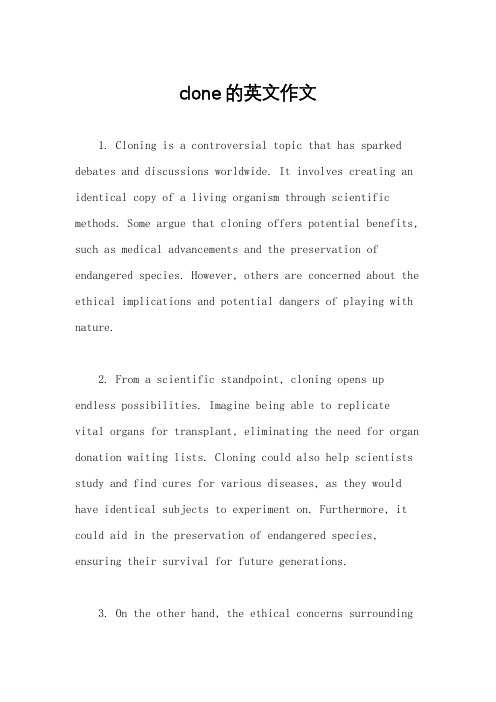
clone的英文作文1. Cloning is a controversial topic that has sparked debates and discussions worldwide. It involves creating an identical copy of a living organism through scientific methods. Some argue that cloning offers potential benefits, such as medical advancements and the preservation of endangered species. However, others are concerned about the ethical implications and potential dangers of playing with nature.2. From a scientific standpoint, cloning opens up endless possibilities. Imagine being able to replicatevital organs for transplant, eliminating the need for organ donation waiting lists. Cloning could also help scientists study and find cures for various diseases, as they would have identical subjects to experiment on. Furthermore, it could aid in the preservation of endangered species, ensuring their survival for future generations.3. On the other hand, the ethical concerns surroundingcloning cannot be ignored. The idea of creating life in a laboratory raises questions about the sanctity of life and the role of humans in playing God. Cloning also raises concerns about the potential abuse of this technology, such as creating clones for organ harvesting or even creating an army of clones for warfare.4. Additionally, there are potential dangers associated with cloning. The cloning process is not foolproof, and there is a risk of genetic abnormalities and health issues in cloned organisms. These risks could have far-reaching consequences, both for the clones themselves and the environment they are introduced into. It is crucial to consider the long-term effects and potential unintended consequences of cloning.5. Despite the controversies and risks, cloning continues to be an area of active research and debate. Itis essential to have open discussions and thorough regulation to ensure that any advancements in cloning are used responsibly and ethically. As with any scientific breakthrough, it is crucial to strike a balance betweenprogress and the well-being of all living organisms.6. In conclusion, cloning is a complex and multifaceted topic that elicits strong opinions from both supporters and critics. While it offers potential benefits in various fields, it also raises ethical concerns and potential dangers. As the field of cloning continues to evolve, it is crucial to approach it with caution and careful consideration of the implications it may have on our society and the world as a whole.。
cloning英语作文
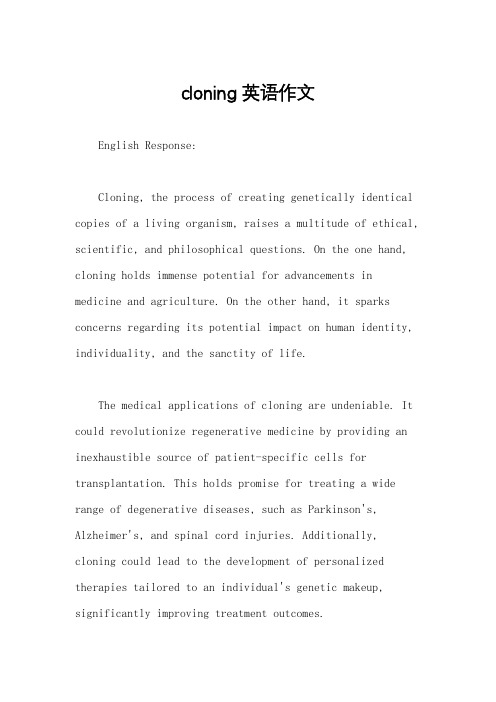
cloning英语作文English Response:Cloning, the process of creating genetically identical copies of a living organism, raises a multitude of ethical, scientific, and philosophical questions. On the one hand, cloning holds immense potential for advancements in medicine and agriculture. On the other hand, it sparks concerns regarding its potential impact on human identity, individuality, and the sanctity of life.The medical applications of cloning are undeniable. It could revolutionize regenerative medicine by providing an inexhaustible source of patient-specific cells for transplantation. This holds promise for treating a wide range of degenerative diseases, such as Parkinson's, Alzheimer's, and spinal cord injuries. Additionally, cloning could lead to the development of personalized therapies tailored to an individual's genetic makeup, significantly improving treatment outcomes.However, cloning also raises significant ethical concerns. One primary concern is the potential for discrimination and social inequality. If cloning were to become widespread, it could lead to the creation of "designer babies," individuals specifically engineered to possess certain desirable traits. This could exacerbate existing social and economic disparities, creating asociety where only the wealthy and privileged have accessto genetically superior offspring.Another ethical concern revolves around the issue of identity. If an individual is cloned, would their clone possess a unique identity or merely be a copy of the original? Would they have the same rights, responsibilities, and moral standing as their genetic progenitor? These questions challenge our fundamental understanding of whatit means to be human and raise profound questions about the nature of self and individuality.Beyond ethical concerns, cloning also presents a number of scientific challenges. Technical difficulties in thecloning process often lead to abnormalities and developmental defects in cloned organisms. Additionally, there are concerns about the long-term health effects of cloning. Studies have shown that cloned animals may age prematurely and have an increased susceptibility to certain diseases.Furthermore, cloning raises philosophical questions about the sanctity of life. Some argue that cloningviolates the natural order and undermines the unique value of each individual. Others contend that cloning is simply a new reproductive technology that should be subject to the same ethical considerations as traditional forms of reproduction.Overall, the ethical, scientific, and philosophical implications of cloning are complex and multifaceted. While cloning holds immense potential for medical advancements, it also raises profound questions about human identity, equality, and the nature of life. These complex issues require careful ethical scrutiny and extensive public discourse before any widespread adoption of cloningtechnologies.中文回答:克隆。
Cloning_范文
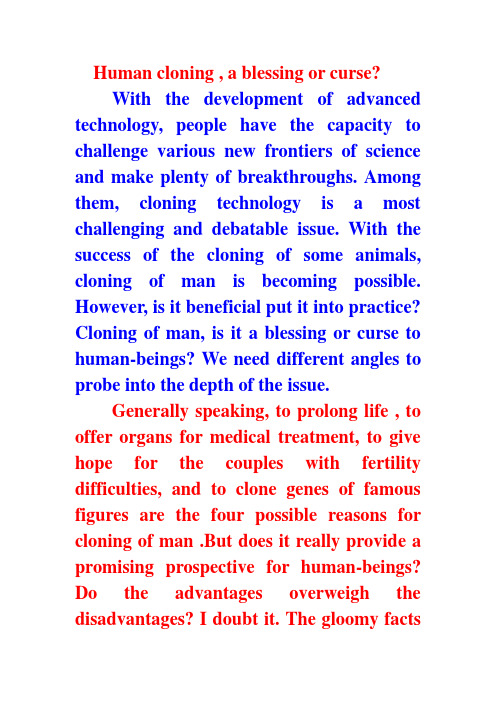
Human cloning , a blessing or curse?With the development of advanced technology, people have the capacity to challenge various new frontiers of science and make plenty of breakthroughs. Among them, cloning technology is a most challenging and debatable issue. With the success of the cloning of some animals, cloning of man is becoming possible. However, is it beneficial put it into practice? Cloning of man, is it a blessing or curse to human-beings? We need different angles to probe into the depth of the issue.Generally speaking, to prolong life , to offer organs for medical treatment, to give hope for the couples with fertility difficulties, and to clone genes of famous figures are the four possible reasons for cloning of man .But does it really provide a promising prospective for human-beings? Do the advantages overweigh the disadvantages? I doubt it. The gloomy factswill definitely cast a shadow on the rosy fantasy.Firstly, cloning of man will surely not prolong life but to make it worse, bring disasters to the human race. As is known to all, the dramatic exposition of population has already caused lots of social problems .The increasing number of cloned people will undoubtedly worsen the situation .On the other hand, cloned people are absolutely different from the ones from whom cells for cloning were taken. It is really ridiculous to think that the development of the cloned man can be taken as the prolonged life span for the original ones.Secondly, it is inhumane to offer organs for medical treatment by cloning of man. As civilized people, how could we sacrifice the lives of the donors of the organ to meet our bloody needs? Even the cloned creatures should enjoy the equality of human-beingsand at least the right to live.Thirdly, as for the purpose to give hope for the couples with labor difficulties, at first glance, it seems satisfying to provide the precious opportunities to produce offspring for them. Nevertheless, it will do no good for human-beings as a whole. For one thing, If it were a common phenomenon, the mass production of the cloned men would be a tragedy for human-beings. Since it did not belong to the natural way to give birth, without following the rule for choosing the fittest, human-beings would gradually slow down the development or even come to a halt. For another, the moral identity of the cloned kid would be a touchy issue for couples to think over.Last but not least, It is merely a fantasy to clone the genes of famous figures in the aim of making brilliant achievements for human-beings. Even it were possible to clone the exact genes of famous figures inthe past, we could not make certain it would bring sunshine for us. Because we can not deny the fact that apart from genes, many other factors like education, cultivation and present situation will also affect the development of a man.In conclusion, the disadvantages of cloning of man overweigh its advantages. Cloning of man will be absolutely a curse for human-beings other than a blessing. As the saying goes, nature never betrays the heart that loves him. Anyone who betrays nature, who go against the rule of nature, will end in miserable fortune.。
英语作文对克隆的看法
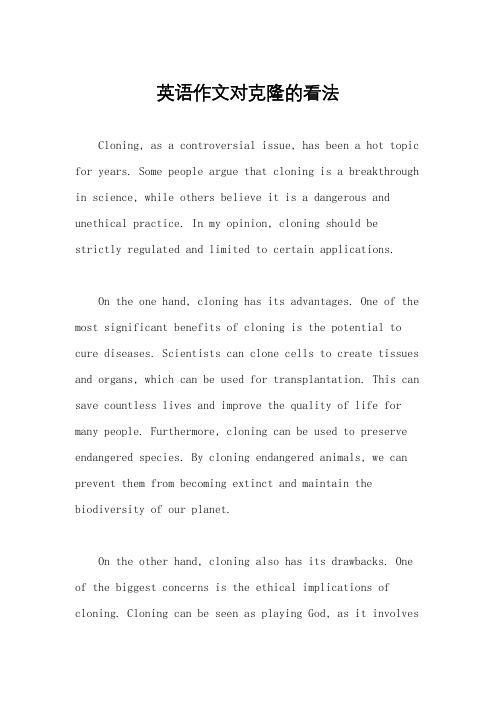
英语作文对克隆的看法Cloning, as a controversial issue, has been a hot topic for years. Some people argue that cloning is a breakthrough in science, while others believe it is a dangerous and unethical practice. In my opinion, cloning should bestrictly regulated and limited to certain applications.On the one hand, cloning has its advantages. One of the most significant benefits of cloning is the potential to cure diseases. Scientists can clone cells to create tissues and organs, which can be used for transplantation. This can save countless lives and improve the quality of life for many people. Furthermore, cloning can be used to preserve endangered species. By cloning endangered animals, we can prevent them from becoming extinct and maintain the biodiversity of our planet.On the other hand, cloning also has its drawbacks. One of the biggest concerns is the ethical implications of cloning. Cloning can be seen as playing God, as it involvescreating life in a laboratory. Additionally, cloning can lead to a lack of genetic diversity, which can result in weakened immune systems and increased susceptibility to diseases. Moreover, cloning can be used for nefarious purposes, such as creating armies of identical soldiers or producing designer babies.In my opinion, cloning should be strictly regulated and limited to certain applications. While the potential benefits of cloning are significant, the ethical concerns cannot be ignored. Cloning should only be used for medical purposes, such as creating tissues and organs for transplantation. Furthermore, cloning should be used to preserve endangered species, but only under strict guidelines and regulations. Finally, cloning should be banned for any other purpose, such as creating armies of soldiers or producing designer babies.In conclusion, cloning is a complex issue with both benefits and drawbacks. While it has the potential to cure diseases and preserve endangered species, it also raises ethical concerns and can be used for nefarious purposes.Therefore, cloning should be strictly regulated and limited to certain applications. It is important that we carefully consider the potential consequences of cloning and make informed decisions about its use.。
对克隆的看法 英语作文

对克隆的看法英语作文Cloning is a controversial topic that has been debated by scientists, politicians, and the general public for many years. Some people believe that cloning is a breakthroughin science that can help cure diseases and improve the quality of life, while others argue that it is unethicaland could have unforeseen consequences.On the one hand, cloning has the potential to revolutionize medicine and improve the health of millionsof people. For example, scientists have alreadysuccessfully cloned sheep, cows, and other animals, which could lead to the production of more nutritious anddisease-resistant food. Additionally, cloning could be used to create organs for transplant, which would eliminate the need for donors and reduce the risk of rejection.Furthermore, cloning could help treat genetic diseases and disorders. By cloning healthy cells and tissues,doctors could replace damaged or diseased cells in patients,potentially curing diseases like Parkinson's, Alzheimer's, and cancer. This would be a huge breakthrough in the medical field and could save countless lives.On the other hand, there are many ethical concerns surrounding cloning. Some people argue that cloning is playing God and that it is wrong to create life in a laboratory. Additionally, there are concerns about the safety of cloning, as it is still a relatively new technology and there could be unforeseen consequences.Moreover, cloning could lead to a lack of genetic diversity, which could have negative consequences for future generations. If everyone is genetically identical, there would be no way to adapt to changing environments or fight off new diseases.In conclusion, cloning is a complex issue with both potential benefits and ethical concerns. While it is important to continue researching and exploring the possibilities of cloning, it is also important to consider the ethical implications and potential risks. Ultimately,the decision to clone should be made with caution and careful consideration of all the factors involved.。
赞成克隆英文作文
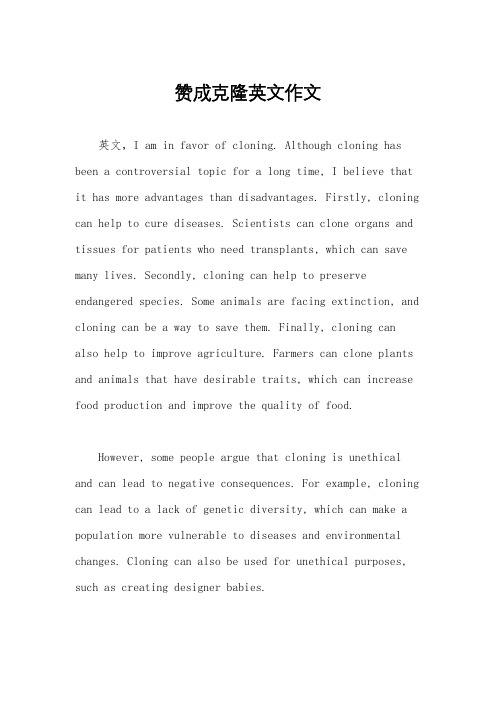
赞成克隆英文作文英文,I am in favor of cloning. Although cloning has been a controversial topic for a long time, I believe that it has more advantages than disadvantages. Firstly, cloning can help to cure diseases. Scientists can clone organs and tissues for patients who need transplants, which can save many lives. Secondly, cloning can help to preserve endangered species. Some animals are facing extinction, and cloning can be a way to save them. Finally, cloning can also help to improve agriculture. Farmers can clone plants and animals that have desirable traits, which can increase food production and improve the quality of food.However, some people argue that cloning is unethical and can lead to negative consequences. For example, cloning can lead to a lack of genetic diversity, which can make a population more vulnerable to diseases and environmental changes. Cloning can also be used for unethical purposes, such as creating designer babies.Despite these concerns, I still believe that cloning has more benefits than drawbacks. As long as cloning is used for ethical purposes and regulated properly, it can bring many positive changes to our world.中文,我赞成克隆。
clone英语作文
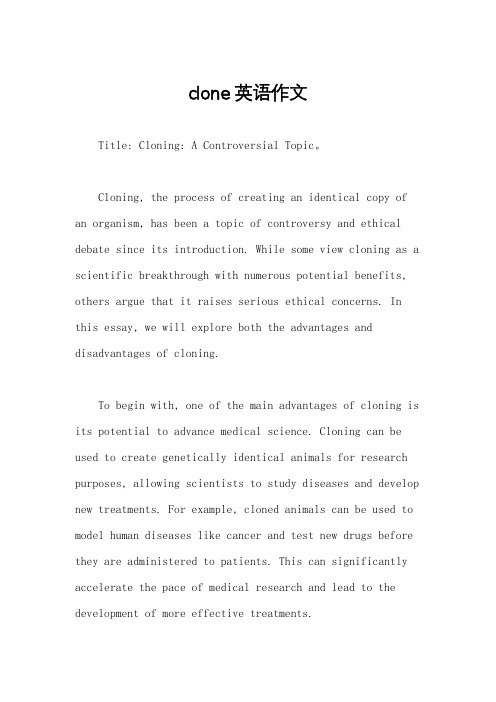
clone英语作文Title: Cloning: A Controversial Topic。
Cloning, the process of creating an identical copy of an organism, has been a topic of controversy and ethical debate since its introduction. While some view cloning as a scientific breakthrough with numerous potential benefits, others argue that it raises serious ethical concerns. In this essay, we will explore both the advantages and disadvantages of cloning.To begin with, one of the main advantages of cloning is its potential to advance medical science. Cloning can be used to create genetically identical animals for research purposes, allowing scientists to study diseases and develop new treatments. For example, cloned animals can be used to model human diseases like cancer and test new drugs before they are administered to patients. This can significantly accelerate the pace of medical research and lead to the development of more effective treatments.Furthermore, cloning has the potential to help preserve endangered species. By cloning endangered animals, we can prevent their extinction and restore their populations. This can be particularly important for species that are on the brink of disappearing due to habitat destruction, poaching, or other human activities. Cloning could provide a last resort for saving these species from extinction and preserving biodiversity.In addition to its medical and conservation benefits, cloning also has practical applications in agriculture. Cloned animals can be engineered to produce higher quality meat or milk, leading to increased food production and improved food security. Moreover, cloning can be used to propagate plants with desirable traits, such as disease resistance or increased yield, helping farmers to cultivate more resilient crops.However, despite these potential benefits, cloning also raises significant ethical concerns. One of the mainethical issues surrounding cloning is the welfare of clonedanimals. Cloning can result in a high failure rate, with many cloned animals suffering from health problems or abnormalities. These animals may experience pain and suffering, raising questions about the morality of cloning for scientific or commercial purposes.Moreover, cloning raises concerns about the commodification of life. Critics argue that cloning reduces living organisms to mere products that can be bought, sold, and manipulated for human purposes. This raises profound ethical questions about the value of life and the dignity of living beings. Additionally, there are concerns about the potential misuse of cloning technology, such as the cloning of humans for reproductive purposes or the creation of "designer babies" with desired traits.In conclusion, cloning is a complex and controversial topic with both advantages and disadvantages. While cloning has the potential to revolutionize medicine, conservation, and agriculture, it also raises serious ethical concerns about animal welfare, the commodification of life, and the misuse of technology. As we continue to develop cloningtechnology, it is important to carefully consider these ethical implications and ensure that cloning is used responsibly and ethically.。
克隆的好坏英语作文
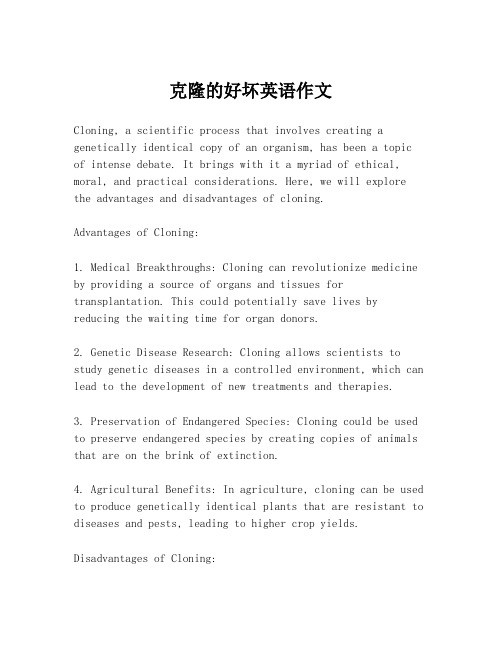
克隆的好坏英语作文Cloning, a scientific process that involves creating a genetically identical copy of an organism, has been a topic of intense debate. It brings with it a myriad of ethical, moral, and practical considerations. Here, we will explore the advantages and disadvantages of cloning.Advantages of Cloning:1. Medical Breakthroughs: Cloning can revolutionize medicine by providing a source of organs and tissues for transplantation. This could potentially save lives by reducing the waiting time for organ donors.2. Genetic Disease Research: Cloning allows scientists to study genetic diseases in a controlled environment, which can lead to the development of new treatments and therapies.3. Preservation of Endangered Species: Cloning could be used to preserve endangered species by creating copies of animals that are on the brink of extinction.4. Agricultural Benefits: In agriculture, cloning can be used to produce genetically identical plants that are resistant to diseases and pests, leading to higher crop yields.Disadvantages of Cloning:1. Ethical Concerns: Cloning raises significant ethical issues, such as the potential for creating life for the sole purpose of organ harvesting, which can be seen as a violation of the sanctity of life.2. Identity and Individuality: Cloned individuals may struggle with their sense of identity and individuality, as they are genetically identical to another being.3. Biological Risks: There is a risk of genetic defects and health issues in cloned organisms, as seen in the case of Dolly the sheep, who suffered from premature arthritis and died prematurely.4. Social Implications: Cloning could lead to a slippery slope where human cloning becomes a reality, potentially leading to a society where certain individuals are cloned for specific purposes, such as labor or military service.In conclusion, while cloning offers promising avenues for scientific and medical advancement, it also presents a complex web of ethical and moral challenges that society must carefully navigate. The balance between the potentialbenefits and the inherent risks is delicate and requires thoughtful consideration and regulation to ensure that the pursuit of knowledge does not compromise our values and principles.。
- 1、下载文档前请自行甄别文档内容的完整性,平台不提供额外的编辑、内容补充、找答案等附加服务。
- 2、"仅部分预览"的文档,不可在线预览部分如存在完整性等问题,可反馈申请退款(可完整预览的文档不适用该条件!)。
- 3、如文档侵犯您的权益,请联系客服反馈,我们会尽快为您处理(人工客服工作时间:9:00-18:30)。
雅思写作高分范文赏析:C l o n i n gC l o n i n gS h o r t l y a f t e r t h e a n n o u n c e m e n t t h a t B r i t i s hs c i e n t i s t s h a d s u c c e s s f u l l yc l o n ed a s he e p,D o l l y,c l o n i n g h u m a n s h a sr e c e n t l y b e c o m e a p o s s i b i l i t y t h a ts e e m s m u c h m o r e f e a s i b l e i n t o d a y’s s o c i e t y. T h e w o r d c l o n e h a s b e e n a p p l i e d t oc e l l s a s w e l l a s t o o r g a n i s m s,s o t h a t a g r o u p o f c e l l s s t e m m i n g f r o m a s i n g l ec e l l i s a l s o c a l l ed a c l o n e. U s u a l l y t he m e m b e r s of a c l o n e a r e i d e n t i c a l i nt h e i r i n h e r i t e d c h a r a c t e r i s t i c s t h a t i s,i nt h e i r g e n e s e x c e p t f o r a n yd i f fe r e n c e s c a u s e d b y m u t a t i o n. I d e n t i c a l t w i n s,f o r e x a m p l e,w h o o r ig i n a t e b yt h e d i v i s i o n o f a s i n g l e f e r t i l i z e d e g g,a r em e m b e r s o f a c l o n e;w h e r e a sn o n i d e n t i c a l t w i n s, w h o d e r i v e f r o m t w o s e p a r a t e f e r t i l i z e d e g g s,a r e n o tc l o n e s.(M i c r o s o f t?E n c a r t a?97E n c y c l o p ed i a). T he r e a r e t w o k n o w n w a y s t h a t w ec a n c l o n e h u m a n s.T h e f i r s t w a y i n v o l v e ss p l i t t i n g a n e m b r y o i n t o s e v e r a l h a l v e sa n d c r e a t i n g m a n y n e w i n d i v i d u a l s f r o m t h a te m b r y o.T h e s e c o n d m e t h o d of c l o n i n ga h u m a n i n v o l v e s t a k i n g c e l l s f r o m a n a l r e a d y e x i s t i n g h u m a nb e i n g a n dc l o n i n gt h e m,i n t u r n c r e a t i n g o t h e r i n d i v i d u a l s t h a t a r e i d e n t i c a l t o t h a t p a r t i c u l a rp e r s o n. W i t h t h e s e t w o m e t h o d s a t o u r d e s p o s a l, w e m u s t a s k o u r s e l v e s t w o v e r yi m p o r t a n t q u e s t i o n s: S h o u l d w e d o t h i s, a n d C a n w e?T h e r e i s n o d o u b t t h a t m a n yp r o b l e m s i n v o l v i n g t h e t e c h n o l o g i c a l a n de t h i c a l s i d e s of t h i s i s s u e w i l l a r i s ea n d w i l lb e v i r t u a l l y i m p o s s i b l e t o a v o i d,b u t t h e o v e r a l l i d e a o fc l o n i n gh u m a n s i s o n e t h a t w e s h o u l d a c c e p t a s a p o s s i b l e r e a l i t y f o r t h e f u t u r e.C l o n i n g h u m a n s i s a n i d e a t h a t h a s a l w a y s b e e n t h o u g h t o f a s s o m e t h i n g t h a tc o u ld bef o u n d i n s c i e n c e f i c t i o n n o v e l s,b u t n e v e r a s a c o n c e p t t h a t s o c i e t yc o u ld a c t u a l l ye x p e r i e n c e.T o d a y’st e c h n o l o g i c a l s p e e d h a s b r o u g h t u s t o t h ep i o n t t o w h e r e a l m o s t a n y t h i n g i s p o s s i b l e.S a r a h B.T e g e n,‘97M I T B i o l o g yU n d e r g r a d u a t e P r e s i d e n t s t a t e s,I t h i n k t h ec l o n i n g o f a n e n t i r e m a m m a l h a ss h o w n m e e x a c t l y h o w f a s t b i o l o g y i s m o v i n g a h e a d, I h a d n o i d e a w e w e r e s oc l o s e t o t h i s k i nd o f a c c o m p l i s h me n t.B a s e d o n t h e c u r r e n t s c i e n c e,t h o u g h,m o s t o f t h e s e d r e a m s a n d f e a r s a r e p r e m a t u r e, s a y s o m e M I T b i o l o g i s t s.M a n yb i o l o g i s tc l a i m t h a t t r u e h u m a n c l o n i n g i ss o m e t h i n g s t i l l f a r i n t h e f u t u r e.T h i s r a i s e s e t h i c a l q u e s t i o n s n o w a s t o w h e t h e r o r n o t h u m a n c l o n i n g s h o u l d e v e nb e a t t e m p t e d.T h e r e a r e m a n y p r o b l e m s w i t h c l o n i n g h u m a n s. O n e m e t h o d o f h u m a n c l o n i n g i ss p l i t t i n g e m b r y o s. T h e m a i n i s s u e a s t o w h e t h e r o r n o t h u m a n c l o n i n g i s p o s s i b l et h r o u g h t h e s p l i t t i n g o f e m b r y o s b e g a n i n1993 w h e n e x p e r i m e n t a t i o n w a s d o n e a tG e o r g e W a s h i n g t o n U n i v e r s i t y M e d i c a l C e n t e r i n W a s h i n g t o n D.C.T h e r e D r.J e r r yH a l l e x p e r i m e n t e d w i t h t h e p o s s i b i l i t y o f h u m a n c l o n i n g a n d b e g a n t h i s m o r a l a n de t h i c a l d e b a t e.T h e r e i t w a s c o n c l u d e d t h a tc l o n i n g i s n o t s o m e t h i n g t h a t c a n b ed o ne a s of n o w, b u t i t i s q u i t e a p o s s i b i l i t y f o r t h e f u t u r e.T h e s e s c i e n t i s t se x p e r i m e n t e d e a g e r l y i n a i m s of l e a r n i ngh o w t o c l o n e h u m a n s.R u t h M a c k li n o fU.S.N e w s W o r l d R e p o r t w r i t e s,H a l l a n d o t h e r s c i e n t i s t s s p l i t s i n g l eh u m a n s e m b r y o s i n t o i d e n t i c a l c o p i e s,at e c h n o l o g y t h a t o p e n s a P a n d o r a’s b o x o fe t h i c a l q u e s t i o n s a n d h a s s p a r k e d a s t o r m of c o n t r o v e r s y a r o u n d t h e w o r l dT h e y a t t e m p t e d t o c r e a t e s e v e n t e e n h u m a n e m b r y o s i n a l a b o r a t o r y d i s h a n dw h e n i t h a d g r o w n e n o u g h,s e p a r a t e d t h e m i n t o f o r t y-e i g h t i n d i v i d u a l c e l l s.T w oo f t h e s e p a r a t e d c e l l s s u r v i v e d f o r a f e w d a y s i n t h e l a b d e v e l o p e d i n t o n e wh u m a n e m b r y o s s m a l l e r t h a n t h e h e a d o f a p i n a n d c o n s i s t i n g o f t h i r t y-t w o c e l l se a c h.A l t h o u g h w e c a n n o t c l o n e a h u m a n y e t,t h i se x p e r i m e n t o c c u r r e d a l m o s t t w oy e a r s a g o a n d t r i g g e r e d a l m o s t a n e t h i c a le m e r g e n c y.E v i d e n c ef r o m t h e s ee x p e r i m e n t s r e c e i v e d s t r a n g e r e a c t i o n sf r o m t h e p u b l i c.R u t h M a c k l i n s t a t e s,C l o n i n g i s a r a d i c a l c h a l l e n g e t o t h e m o s tf u n d a m e n t a l l a w s o f b i o l og y,s o i t’sn o t u n r e a s o n a b l e t o b e c o n c e r n e d t h a t i t m i g h t t h r e a t e n h u m a n s o c i e t y a n dd i g n i t y.Ye t m u c h of t h e e t h i c a l o p p o s i t i o ns e e m s a l s o t o g r o w o u t o f a nu n t h i n k i n g d i s g u s t--a s o r t o f y u k f a c t o r.A n d t h a t m a k e s i t h a r d f o r e v e nt r a i n e d s c i e n t i s t s a n d e t h i c i s t s t o s e e t h em a t t e r c l e a r l y.W h i l e h u m a n c l o n i n gm i g h t n o t o f f e r g r e a t b e n e f i t s t o h u m a n i t y,n o o n e h a s y e t m a d e a p e r s u a s i v ec a s e t h a t i t w o u ld d o a n y re a l h a r m,e i t h e r. T h e o l o g i a n s c o n t e n d t h a t t o c l o n e a h u m a n w o u l d v i o l a t e h u m a n d i g n i t y.T h a tw o u l d s u r e l y b e t r u e i f a c l o n e d i n d i v i d u a l w e r e t r e a t e d a s a l e s s e r b e i n g,w i t hf e w e r r igh t s o r l o w e r s t a t u r e.B u t w h y s u p p o s e t h a t c l o n e d p e r s o n s w o u l d n’ts h a r e t h e s a m e r i g h t s a n d d i g n i t y a s t h e r e s t o f u s?I f a n d w h e n c l o n i n g c o m e sa b o u t, w i l l p e o p l e b e w i l l i n g t o p a y a n y t h i n g f o ra c l o n e o f t h e m s e l v e s?I t i ss u c h a c o s t l y f o r m o f t e c h n o l o g y. A s w e s e e w i t h s o m a n y o t h e r a s p e c t s o ft o d a y’s s o c i t y,p e o p l e w i l l d o a l l k i n d s o f t h i n g s f o r m o n e y.(W i l l h u m a nc l o n i n g m a k e a t y p e o f b l a c k m a r k e t f o r e m b r y o s c o u lde a s i l y s o m e d a y d e v e l o p?)P a r e n t s a l r e a d y s p e n d a g r e a t d e a l o f m o n e y o n i n v i t r o f e r t i l i z a t i o n,a n d w h ok n o w s h o w m u c h t h e y w o u l d b e w i l l i n g t o p a y f o r c l o n i n g t h e i r c h i l d r e n?T h eq u e s t i o n a s t o w h a t c l o n i n g w o u l d d o t o s o c i e t y f r o m b o t h t h e m o r a l a n d e c o n o m i cs t a n d p o i n t s c o m e s t o t h e c o n c l u s i o n t h a t f o r t h e m o s t p a r t c l o n i n g i s t o oe x p e n s i v e a n d t o o d a n g e r o u s.I n t h e r e l i g o u s c i r c l e s t h e q u e s t i o n of h u m a nc l o n i n g h a s s t i r r ed de b a t e.R e v.R o b e r t A.M a r t i n s t a t e s:I t a p p e a r s t h a t f r o mt h e b e g i n n i n g G o d r e s e r v e d f o r H i m s e l f t h e r i g h tt o c r e a t e l i v i n g s o u l s.Iu n d e r s t a n d t h a t t h e p h i l o s o p h y o f m o d e r np s y c h i a t r y i s t o t e a c h t h a t h u m a nb e i n g s a r e s o u l l e s s, t h e r e f o r e w e a r e j u s t f l e s h a n d b l o o d w h ic h c a n o n l yr e s p o n d t o t h e e n v i r o n m e n t w i t h n o a b i l i t y t o m a k e c o n s c i o u s d e c i s i o n s f o ri t s e l f.I n o t h e r w o r d s p e o p l e a r e n o d i f f e r n e t t h a n a n i m a l s t o b e u s e d a n dm a n i p u l a a t e d.T h u s,t h e r e i s,f r o m t h eb e g i n n g i n g,a f u n d a m e n t a l d i f f e r e nc eb e t w e e n w h a t t h e B i b l e t e ac h e s a nd w h a tp s y c h i a t r y t e a c h e s.T h i s b e i n g t h e c a s e,i t i s l i t t l e w o n d e r t h e n, t h a t s o m e p e o p l e a s s u m e t h e p r e r o g a t i v e o f p l a y i n g t h er o l e o f g o d.E m b r y o n i c c l o n i n g c o u l d b e a v a l u a b l e t o o l f o r t h e s t u d y i n g o f h u m a nd e v e l o p m e n t, g e n e t i c a l l y m o d i f y i n g e m b r y o s, a n d i n v e s t i g a t i n g n e w t r a n s p l a n tt e c h n o l o g i e s.U s i n g c l o n i n g t o p r o d u c eo f f s p r i n g f o r t h e s a k e o f t h e i r o r g a n s i sa n i s s u e t h a t w e m u s t a l s o f a c e a n d q u e s t i o nw h e t h e r o r n o t i t i s m o r a l l y r i g h t.N o o n e w i l l s a y t h a t i t i s o k a y t o k i l l a h u m a n b e i n g f o r t h e s a k e o f t h e i ro r g a n s.B u t w i l l m a n y h a v e n o o b j e c t i o n t oc l o n i n g t h o u s a nd s o f i n d i v i d u a l s f o rt h e s a k e o f o r g a n t r a n s p l a n t s? T e c h n o l o g y s e e m s t o t a k e a w a y m a n y o f t h e m o r a l st h a t w e h a v e w o r k e d s o h a r d t o i n s t a l l i n s o c i e t y. M o s t p e o p l e o n l y s e e m t o w a n tt o c a t e r t o t h e i r o w n n e e d s a n d d o n o t b o t h e r t o c o n s i d e r t h e c o n s e q u e n c e s t h a ts o c i e t y a n d t h e c l o n e m a y h a v e t o f a c e. W i t h t h e i s s u e o f p a r e n t s’i n v o l v e m e n ti n c l o n i n g,R u t h M a c k l i n,w r i t e s,P e r h a p s ag r i e v i n g c o u p l e w h o s e c h i l d i sd y i n g. T h i s m i g h t se e m p s y c h o l o g i c a l l y t w i s t e d.B u t a c l o n e d c h i l d b o r n t o s u c hd u b i o u s p a re n t s s t a n d s n o g r e a t e r o r l e s s e rc h a n c e o f b e i n g l o v e d,o r r e j e c t e d,o r w a r p e d t h a n a c h i l d n o r m a l l y c o n c e i v e d.I n f e r t i l e c o u p l e s a r e a l s o l i k e l y t os e e k o u t c l o n i n g.T h a t s u c h c o u p l e s h a v e o t h e r o p t i o n s(i n v i t r o f e r t i l i z a t i o no r a d o p t i o n) i s n o t a n a r g u m e n t f o r d e n y i n g t h e m t h e r i g h t t o c l o n e.O r c o n s i d e ra n e x a m p l e r a i s e db y J u d g e R ic h a rd P o s ne r:a c o u p l e i n w h i c h t h e h u s b a n d h a ss o m e t r a g i c g e n e t i c d e f e c t.C u r r e n t l y,i f t h i s c o u p l e w a n t s a g e n e t i c a l l yr e l a t e d c h i l d,t h e y h a v e f o u r n o t a l t o g e t h e r p l e a s a n t o p t i o n s.T h e y c a nr e p r o d u c e n a t u r a l l y a n d r i s k p a s s i n g o n t h ed i se a s e t o t h e c h i l d.T h e y c a n g o t oa s p e r mb a n k a n d t a k e ac h a n c e o n u n k n o w n g e n e s. T h e y c a n t r y i n v i t r of e r t i l i z a t i o n a n d d i s p o s e o f a n y a f f l i c t e de m b r y o--t h o u g h t h a t m i g h t b eo b j e c t i o n a b l e,t o o.O r t h e y c a n g e t a m a l er e l a t i v e o f t h e f a t h e r t o d o n a t es p e r m,i f s u c h a r e l a t i v e e x i s t s.T h i s i s o n e c a s e w h e r e e v e n p e o p l e u n n e r v e d b yc l o n i n g m i g h t s e e i t a s n o t t h e w o r s t o p t i o n.11。
